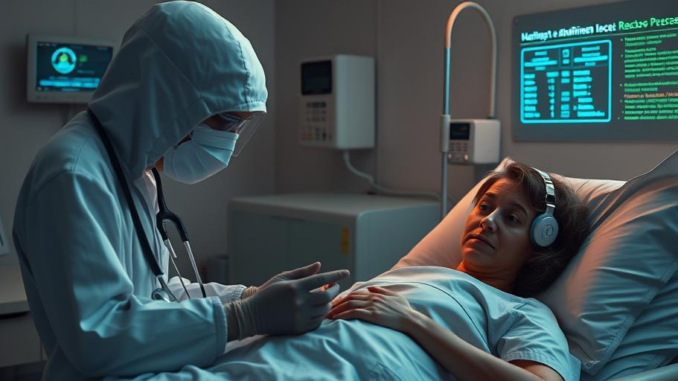
Summary
This article explores the increasing trend of ransomware attacks targeting hospitals and medical establishments in the UK and the US. It examines the devastating consequences of these attacks, including disrupted services, compromised patient data, and financial losses. The article also discusses the historical context of these attacks and the need for robust cybersecurity measures in the healthcare sector.
Main Story
Okay, so let’s talk about something seriously concerning: cyberattacks in healthcare. You know, we’ve embraced digital transformation in medicine, which is fantastic, but it’s also opened a Pandora’s Box of vulnerabilities. Hospitals are sitting ducks for ransomware attacks, and frankly, the consequences can be devastating. It’s not just about the money, though, it impacts patient safety in a huge way.
Ransomware is a massive problem. Hackers encrypt everything and hold it hostage for a ransom. I mean, since 2015, we’ve seen a 300% jump in these attacks! Think about the impact, surgeries delayed, appointments canceled, emergency rooms overwhelmed. You can’t imagine the chaos, or can you?
Let’s just consider the Dixons Carphone breach a few years back. What a mess. Millions of people’s personal data was exposed; payment card details too! Talk about a wake-up call. And it’s still considered the biggest data breach in the UK to date. It makes you wonder just how secure anyone is, really.
But it’s not just a UK problem, not by a long shot. Over here in the States, Microsoft reported hundreds of successful ransomware attacks on healthcare institutions in just one year. Can you imagine that many? Network shutdowns, system outages, and delayed critical care. It’s a frightening thought and the impact is only growing.
And here’s where it gets really scary: it’s not just about the financial cost, though, that’s bad enough. These attacks can directly affect patient outcomes. If hospital systems are crippled, then treatments are delayed, and survival rates are jeopardized. There was this study by UC San Diego that showed how attacks on hospitals even create spillover effects, increasing cardiac arrest cases in neighboring facilities! Crazy, right?
Now, remember how some ransomware groups said they wouldn’t target hospitals during the pandemic? Well, that went out the window. They’re considered fair game now. Worse yet, the attacks are getting more sophisticated. Microsoft even found increasing coordination between nation-states and cybercriminals, with countries like Russia, North Korea, and Iran using ransomware for financial gain, which is just unbelievable.
So, what’s the answer? It’s clear we need enhanced cybersecurity, period. Hospitals have to prioritize this. That means investing in robust security, cybersecurity training for all staff, and better collaboration with government agencies and cybersecurity experts. It’s all about threat intelligence and response capabilities, you know.
Ultimately, it’s about protecting patient safety in this digital age. That’s why we need a comprehensive approach; one that combines technology with increased awareness, collaboration, and a commitment to cybersecurity across the whole healthcare ecosystem. Otherwise, it’s just a matter of time before the next major attack, isn’t it? And who knows what the consequences will be then.


So, if ransomware groups consider hospitals “fair game” now, does that mean they get bonus points for hitting systems with the most outdated OS? Like some kind of twisted “retro hacking” achievement?
That’s a darkly humorous take! It’s scary to think how outdated some systems are. It’s almost as if they are easier targets, making the attackers job easier. Perhaps focusing on upgrading security for older systems should be a higher priority in the healthcare sector.
Editor: MedTechNews.Uk
Thank you to our Sponsor Esdebe
“Fair game,” huh? So, are hospitals now competing in some sort of twisted cybersecurity Hunger Games? May the best firewall win, and may your data backups always be in your favor.
That’s a great analogy! The “Cybersecurity Hunger Games” is a frighteningly accurate picture. It highlights the high stakes involved and the constant need to be prepared. Perhaps more collaboration and shared resources could shift the odds in favor of hospitals and improve their defenses. What are your thoughts?
Editor: MedTechNews.Uk
Thank you to our Sponsor Esdebe
The increasing coordination between nation-states and cybercriminals highlights the need for healthcare cybersecurity to evolve beyond traditional defense strategies. A proactive, intelligence-led approach may be crucial for effectively countering these sophisticated threats.
That’s an excellent point! The coordination you mentioned is a game-changer. Shifting to an intelligence-led approach allows us to anticipate these sophisticated threats, rather than just reacting. We need to explore how AI and machine learning can enhance threat prediction in healthcare. What strategies do you think would be most effective?
Editor: MedTechNews.Uk
Thank you to our Sponsor Esdebe
The 300% jump in attacks since 2015 underscores the urgency. Beyond security investments, could standardized incident response protocols across healthcare systems help minimize disruption and ensure more consistent patient care during these events?
That’s a great point! Standardized protocols are crucial for minimizing disruption. Sharing best practices and creating a unified front against these attacks could significantly improve response times and patient care. It’s definitely a worthwhile area to explore further and push for implementation!
Editor: MedTechNews.Uk
Thank you to our Sponsor Esdebe
The mention of staff cybersecurity training is key. Ongoing education, particularly regarding phishing and social engineering tactics, is essential. How can we ensure training programs are both effective and engaging for busy healthcare professionals?
Absolutely! Ensuring training is effective and engaging is a challenge. Perhaps microlearning modules, integrated into daily workflows, could help? Gamified training with real-world scenarios might also increase participation and retention, and even build a simulated security culture within the workplace. I wonder what tools are already available?
Editor: MedTechNews.Uk
Thank you to our Sponsor Esdebe
“Sitting ducks,” eh? Guess hospitals need to trade in their stethoscopes for shields and enroll in cybersecurity boot camp. I nominate Dr. House to lead the incident response team. He’s already an expert at diagnosing complex problems!